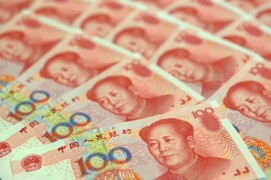The Chinese yuan is making gains against its currency counterparts at the end of the trading week. Despite disappointing industrial output figures and reports of long delays for companies to get paid for their goods and services, the yuan will record a weekly gain against the US dollar and the euro.
According to the National Bureau of Statistics of China, value-added industrial output climbed 5.3 % in the January to February period, compared to the same time a year ago. This is a slowdown from a 5.7% year-over-year increase in December, and it is below the median forecast of 5.5%.
Investment growth improved in the two-month period. The statistics agency reported that fixed-asset investment surged 6.1% from the previous year.
Retail sales surged 8.2%, which continues the upward trend from December and matches the market forecast.
This comes after it was reported that Chinese exports cratered 21% last month amid a cooling economy and the US-China trade war.
Soon after lowering its economic growth outlook from 6.5% to 6%, Premier Li Keqiang confirmed that it will keep its promise by opening up its economy to foreign investors. One way to attract outside investment is by making a series of reforms, and Li noted that Beijing plans to revise its intellectual property rights protection law.
A dangerous development is unfolding in the worldâs second-largest economy. A study by French trade insurer Coface found that Chinese businesses are having a hard time receiving payment from partners. Citing tighter credit conditions, rising bond defaults, and slowing economic growth, 62% of the 1,500 companies surveyed reported delays in getting paid. This trend is impacting a diverse array of sectors, from construction to energy to automotive.
The USD/CNY currency pair tumbled 0.14% to 6.7135, from an opening of 6.7229, at 13:37 GMT on Friday. The EUR/CNY slumped 0.01% to 7.6007, from an opening of 7.5999.
If you have any questions, comments or opinions regarding the Chinese Yuan,
feel free to post them using the commentary form below.
Chinese Yuan Rises Despite Weak Industrial Output
